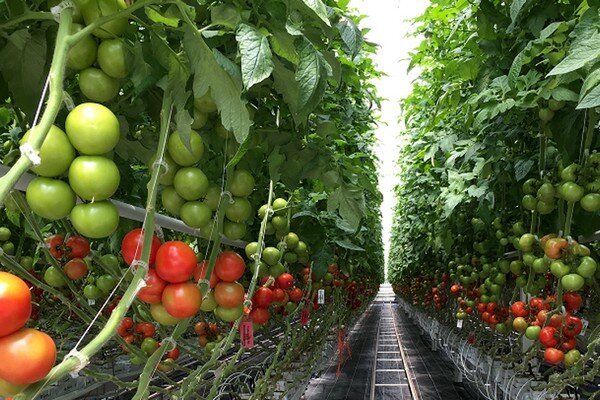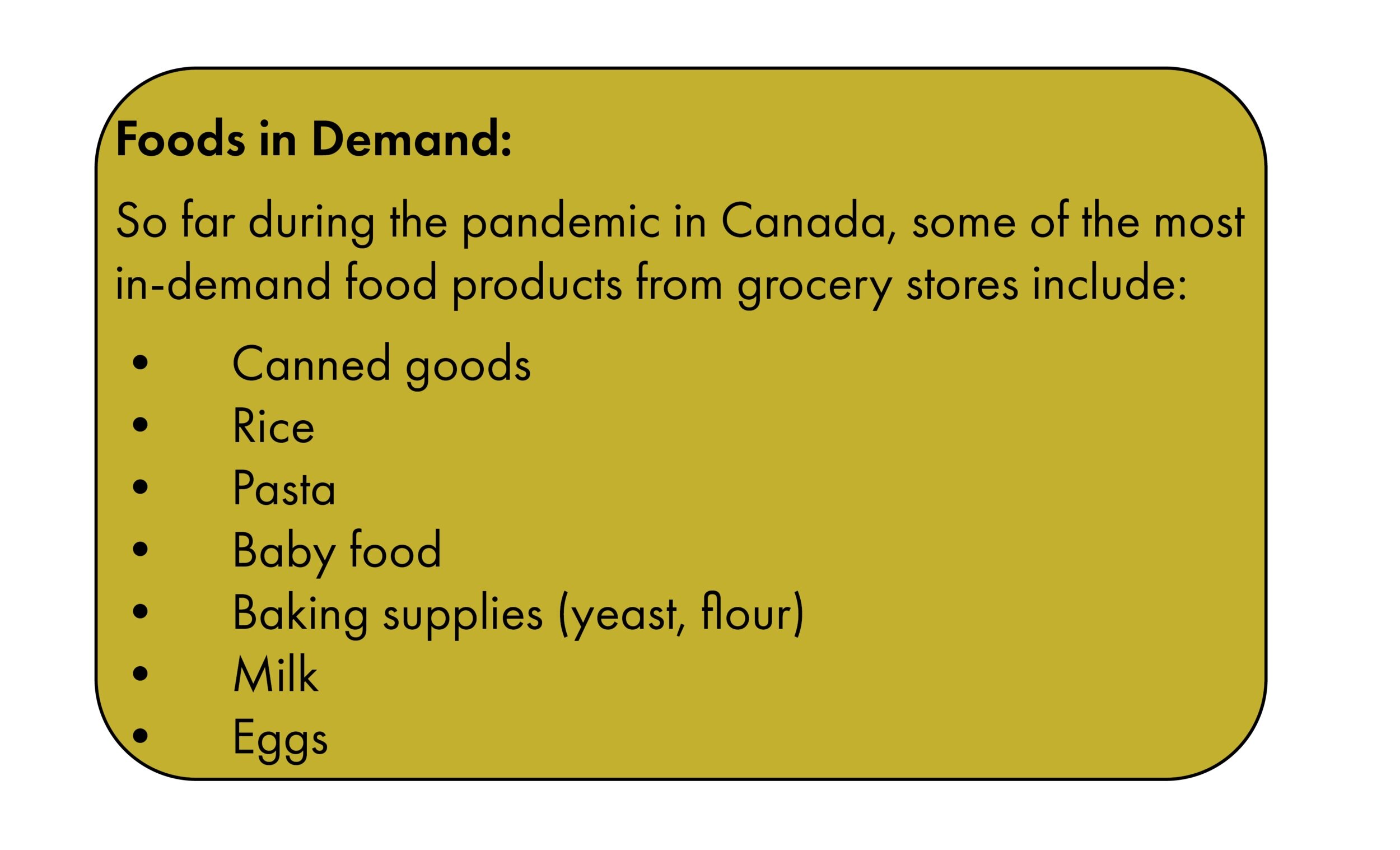Introduction:
The impact of COVID-19 on the Canadian food manufacturing industry has been like no other. Canadian’s are buying more food, restaurants are closing or limiting services, boarder restrictions are in place and the food manufacturing industry is working on adapting its production processes to handle the challenges.
The horticulture industry may be without 50,000 workers, the dairy industry is having to dump excess milk, the seafood industry is stocked with product and nobody to sell it to, the meat industry is so far resilient to the challenges and some manufacturers are reducing the number of products they produce.
This article looks into the impact of the pandemic is having on the food manufacturing industry in Canada.
Factors That Have Impacted the Industry:
Canadians are buying more at grocery stores:
COVID-19 fears resulted in many Canadians heading out to grocery stores to stock-up on essentials. When asked, most people suggest their primary concern was potential supply chain disruptions leading to product shortages, especially for food items. Most Canadians are buying more groceries because they are preparing more meals at home. The Food and Consumer Products of Canada (FCPC) reported that food manufacturers saw an increase of 500 per cent on food order volumes from grocery stores during the last two weeks of March alone.
Restaurants are closing or reducing services:
With the increased recommendation of social distancing in Canada and with provinces and cities declaring state of emergencies, many restaurants have either temporarily closed or reduced services to just take-out and delivery. In 2017, the Canadian restaurant industry was worth more than $85 billion with over 81,000 full-service restaurants and limited-service eating places nationwide. The impact of COVID-19 has led to over 800,000 job losses in the restaurant industry. According to Restaurants Canada, 78 per cent of restaurants reported a lower sales volume in the first two week of March and 92 per cent are worried about sales over the next three months. With many of these restaurants temporally closed or reducing services, it has impacted the food manufacturing industry with reduced demand and the cancellation of bulk orders from suppliers.
Border Restrictions:
The Canadian government closed its borders on March 18, 2020. All foreign nationals have been banned from entering Canada, with the essential travel from the US being the only exception due to trade ties. Closed borders have greatly impacted the food industry with exports and migrant workers prevented from entering Canada.
Many countries have closed ports, imposed travel restrictions and shut down factories, negatively disrupting global trade and international supply chains. The EDC Economics team forecasted in spring 2020 the global growth at a meagre 1.6 per cent for 2020, the lowest it has been since 2008. The EDC Economics team also forecasted that Canada’s economy will only grow 0.4 per cent in 2020 due to the impact of COVID-19 and lower oil prices.
A Look at Specific Sectors:
Horticulture:
The horticulture industry has been impacted by the border restrictions, which is estimated to keep nearly 50,000 migrant workers from entering. Without a solution, famers will be short most of their workforce to plant and harvest their crops. According to the Canadian Horticultural Council, the Canadian horticulture industry produced more than eight million metric tons of produce last year and exported over $5 billion worth. Without migrant workers, the horticulture industry in Canada will be dramatically impacted.
““It’s a huge impact for our growers — not just Ontario, but nationwide. There is no way that we would be able to farm without our migrant workers. I can’t put it any clearer than that,” said Steve Bamford, president of the Toronto Wholesale Produce Association “We will run into a big food security issue if that happens.””
The government announced on March 23, 2020 that migrant workers are considered essential and would be allowed to enter Canada, on the condition that they self-isolate for 14 days upon arrival. Despite this, many farmers are still worried they will arrive late and that crops will not be harvested on time. Even though the migrant workers are allowed into Canada, there are many hoops to jump through, including getting to Canada which has been further complicated with airlines decreasing flights. Many farmers have indicated they would like to hire Canadians to support domestic employment; however, Canadians often do not want these seasonal jobs or do not have the required skill set, leaving farmers with no option but to turn to migrant workers.
Dairy:
In early April many dairy producers were forced to dump excess milk (up to 10,000 litres per producer) down the drain due to the lack of demand from the hospitality industry. Even though dairy famers have seen an increase in the retail side, it has not been enough to offset the decrease in demand from restaurants and other food services who have reduced or cancelled bulk orders.
Seafood:
The seafood industry in Canada has also been impacted mostly due to the lack of demand from the hospitality industry. Owner of West Coast Wild Scallops, Melissa Collier explains how they do their scallop fishing in the winter and stock up to have a steady supply for restaurants in the summer months.
““We stocked up on what we thought we would sell in a normal year and we paid deckhand wages, we have done all of our boat and fuel expenses, and now we have a bunch of product sitting in cold storage that we are paying monthly fees on that we may never be able to sell.” ”
Another impact of COVID-19 on the seafood industry is the closure of the fishing licensing offices, which has resulted in significant delays in receipt of permits and thus, lower fishing activity levels. The government is helping the seafood industry with access to the $5 billion Farm Credit Canada loan program. The Farm Credit Canada program offers a 24-month credit line up to $500,000 at a rate of Prime +1% and no fees and is intended to help producers, agribusinesses and food processors to have access to the cash flow they need to manage through this challenging time.
Meat:
The beef and cattle industry have barely seen a reduced demand due to COVID-19. Though it has not seen a decrease in demand, it has been impacted by employees testing positive for COVID-19 leading to meat plants shutting down.
““The Canadian beef industry is facing a period of extraordinary uncertainty,” ”
One of Canada’s largest meat plants, Cargill in High River, Alta., which represent around one-third of Canada’s total processing capability has drastically reduced production due to multiple employees testing positive for COVID-19. Cargill is not the only plant that has had to reduce production, many plants have also started to temporarily close. With plants reducing production or closing, the supply of meat will drastically be impacted.
Examples of Production Changes:
The FCPC reported that 80 per cent of manufacturing have increased production due to the pandemic. In the efforts to meet current demand, major food manufacturers in Canada have started to only produce core offerings to boost production efficiency and get food to Canadians faster. Some of these companies and their current production focus are listed below:
AB Mauri Fleischmann's – running the yeast plant at 25 per cent over capacity to meet the demand for yeast.
Italpasta – normally produces 63 types of pasta, during the pandemic the are only producing their top six types of pasta (spaghetti, spaghettini, penne, elbows, fusilli and lasagne).
Nestle Canada – announced it is reducing the number of product offerings for the time being and is closing managing supply chain.
Prairie Flour Mills – normally produces 35 different products, during the pandemic they are just producing basic flour.
Walmart Canada - mentioned that it is working closely with suppliers to cope with changes in demand during the pandemic.
As noted in the above chart, 75 per cent of food manufacturers in Canada project they will be able to keep supplying their products for 2-5+ months. 20 per cent project they will have no issues and five per cent project that they will run into problems with their supply within one month.
Conclusion:
Despite the food manufacturing industry facing new and different challenges due to the impact of COVID-19, many producers have assured Canadians that they will continue to work hard and get food to Canadians. Canadian food manufacturers are putting forward their best efforts in maintaining production while emphasizing sanitation and physical distancing guidelines to protect both employees and customers.
We are all grateful for these unsung heroes who are making sure we have groceries on the shelves and food on the table every day. We also applaud the efforts implemented by Canadian food producers in combating the virus, such as switching their production lines to produce hand sanitizers and other medical equipment to help Canada fight COVID-19.






















